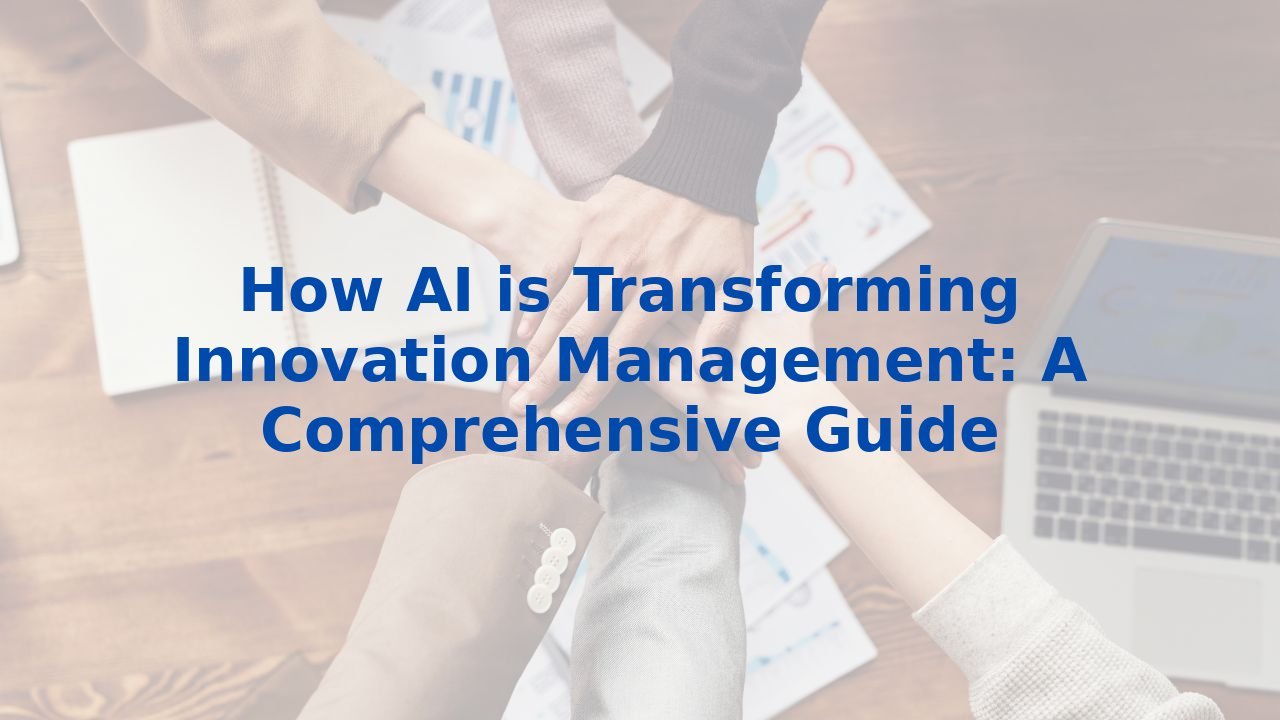How AI is Transforming Innovation Management: A Comprehensive Guide
How AI is Transforming Innovation Management: A Comprehensive Guide
In today's fast-paced corporate landscape, the need for innovation is paramount. Organizations are constantly seeking new ways to enhance their processes, products, and services. This urgency is where Artificial Intelligence (AI) comes into play, not just as a tool but as a transformative force reshaping innovation management. Understanding how AI integrates into business processes can unlock unprecedented efficiency and creativity.
AI in Innovation Management
At the intersection of technology and innovation lies AI's powerful ability to analyze vast datasets, automate mundane tasks, and refine predictive analytics. This capability empowers organizations to streamline their innovation pipeline. By harnessing machine learning systems, businesses can analyze market trends, consumer behavior, and product performance with speed and accuracy.
Imagine having an intelligent system that can sift through thousands of customer feedback entries in minutes, pinpointing key areas that need attention. This kind of automation not only saves time but also uncovers insights that drive innovation. Organizations that embrace these technologies position themselves as leaders in their industries, poised to respond to change and capitalize on new opportunities.
Framework for AI Integration
Integrating AI into the innovation management framework requires strategically rethinking established processes. Traditional human-centric methods often lag when faced with the speed of digital advancements. Therefore, it is essential to develop frameworks that facilitate the seamless integration of AI into existing organizational structures.
These frameworks should prioritize strategic planning, effective data management, and ongoing monitoring. Carefully curated guidelines can help ensure that the implementation of AI is aligned with the company's innovation goals. As companies transition to AI-powered processes, they must consider ethical implications and guardrails to maintain a balance between human creativity and machine efficiency.
Future Research Directions
As businesses harness AI's potential, the road ahead is filled with opportunities for further exploration. Future research could delve into more sophisticated algorithms capable of driving even deeper insights. Moreover, it’s vital to examine how AI interacts with other cutting-edge technologies like blockchain and the Internet of Things (IoT). This multi-faceted approach may yield new paradigms in innovation management.
Benefits of AI for Improving Efficiency
The most compelling advantage of AI is its ability to significantly enhance efficiency within organizations. By automating routine tasks, allowing for real-time data analysis, and improving decision-making processes, companies can redirect valuable resources toward strategic and creative pursuits. This shift allows teams to focus on high-impact projects rather than getting bogged down by repetitive tasks.
Additionally, AI accelerates innovation by predicting market changes and gauging potential risks. With these insights, organizations can make proactive decisions, fostering a culture of agility and responsiveness. This newfound momentum in an organization's operations can lead to quicker time-to-market for new products and increased adaptability in a fluid market landscape.
Benefits of Training Employees for AI
However, merely implementing AI is not enough; for organizations to unlock its full potential, training employees becomes a key focal point. Equipping teams with the skills to work alongside AI can amplify the benefits dramatically. Comprehensive training encompasses understanding AI capabilities, learning to formulate effective prompts, and evaluating AI-generated content critically.
This commitment to training fosters a culture of innovation along with continuous learning within the organization. Employees empowered with AI knowledge become catalysts for transformation, driving new ideas and solutions. When organizations invest in upskilling their workforce, they cultivate more than just a set of competencies; they nurture a mindset inclined towards embracing change and fostering creativity.
Conclusion
As we navigate an era increasingly influenced by AI, understanding its impact on innovation management becomes essential for organizations striving to remain competitive. By embracing AI technologies, crafting robust frameworks for integration, and investing in employee training, businesses can lead their industries into the future with confidence. The evolution of innovation management lies in the narrative of integrating human creativity with machine efficiency—a partnership that promises unmatched potential.
To explore a deeper understanding of how AI can revolutionize your organization, consider engaging with resources that offer a comprehensive approach to AI training. Embracing this journey is not merely about keeping up with trends; it's a commitment to thriving in a world of constant change.
Train your workforce today—because the future of innovation is not just upon us; it's here.



